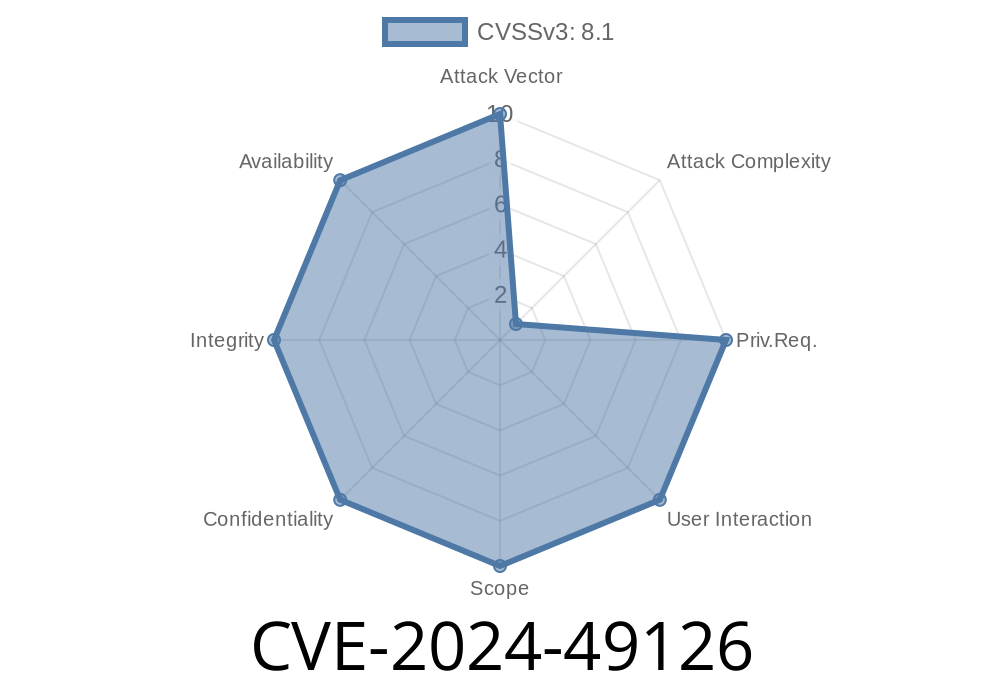On May 15, 2024, Microsoft disclosed CVE-2024-49126, a critical vulnerability impacting the Local Security Authority Subsystem Service (LSASS) in Windows. This flaw could allow remote code execution, making it attractive to attackers aiming to escalate privileges or steal sensitive credentials. In this post, we'll break down how the flaw works, provide a basic exploit example, and offer tips on defense—all in plain, straightforward language.
What is LSASS?
LSASS (lsass.exe) is a key process in every Windows system. It enforces security policies, manages user logins, and, crucially, stores sensitive credentials in memory. Because of its importance, LSASS has always been a target of attackers.
What is CVE-2024-49126?
CVE-2024-49126 is a remote code execution (RCE) vulnerability affecting Windows LSASS. In simple words: an attacker could potentially run malicious code on your computer from somewhere else—if certain network conditions and permissions are fulfilled.
The exploit's core is a flaw in how LSASS processes certain authentication requests sent over the network. Without proper handling, an attacker could send specially crafted packets to trigger the vulnerability.
Windows Server 2016, 2019, 2022
See Microsoft’s advisory for details.
Exploit Details
Precondition:
This is not a classic unauthenticated RCE. The attacker usually needs access to the same network domain, or must be able to pass authentication to interact with LSASS. Sometimes lateral movement is required if initial access is through another compromised machine.
How Does the Exploit Work?
1. Attack Preparation: The attacker sets up a malicious authentication request to LSASS using protocols like NTLM or Kerberos.
2. Triggering the Flaw: By sending the malicious data, LSASS’s vulnerable parser gets confused—overflowing memory or mishandling pointers.
3. Code Execution: If successful, the attacker gains the ability to execute code as SYSTEM—the highest privilege in Windows.
Code Example: (Proof-of-Concept)
Below is a Python snippet showing how an attacker would initiate communication with LSASS. Note: This example does not perform the exploit itself (for ethical reasons), but demonstrates how to start communication similar to what real exploits might do.
import socket
# LSASS listens to Kerberos (port 88) and NTLM (via RPC/SMB)
target_ip = 'TARGET.IP.ADDRESS'
target_port = 88 # Common for Kerberos
malicious_packet = b"\x00\x01\x02\x03... (crafted payload causing overflow)"
with socket.socket(socket.AF_INET, socket.SOCK_STREAM) as s:
s.connect((target_ip, target_port))
s.sendall(malicious_packet)
response = s.recv(1024)
print("Received:", response)
A real exploit would have a much larger payload tailored to LSASS’s memory structure and would deliver a command or shellcode.
Potential wormable spread inside networks
Because LSASS holds domain passwords in memory, if compromised, the whole Active Directory environment can fall.
Mitigation and Detection
- Patch ASAP: Apply Microsoft’s updates.
Network Segmentation: Restrict who can talk to LSASS-related ports.
- Event Monitoring: Watch for odd authentication packets or crashes from LSASS in logs (Event Viewer: System logs).
- Credential Guard: Enable Windows Defender Credential Guard, if possible.
Original References & Further Reading
- Microsoft Security Response Center (MSRC) CVE-2024-49126 Advisory
- Windows Local Security Authority Subsystem Service (LSASS) Overview
- Mitre CVE Detail
- Blog: How attackers abuse LSASS
Conclusion
CVE-2024-49126 is one of the most severe Windows vulnerabilities this year, targeting the nerve center of authentication in Microsoft networks. While the exploit is non-trivial and requires internal access in most setups, its impact is devastating if unpatched. Apply patches quickly, tighten your network, and keep an eye on authentication oddities—your network’s health may depend on it.
Timeline
Published on: 12/12/2024 02:04:39 UTC
Last modified on: 12/20/2024 07:44:43 UTC
